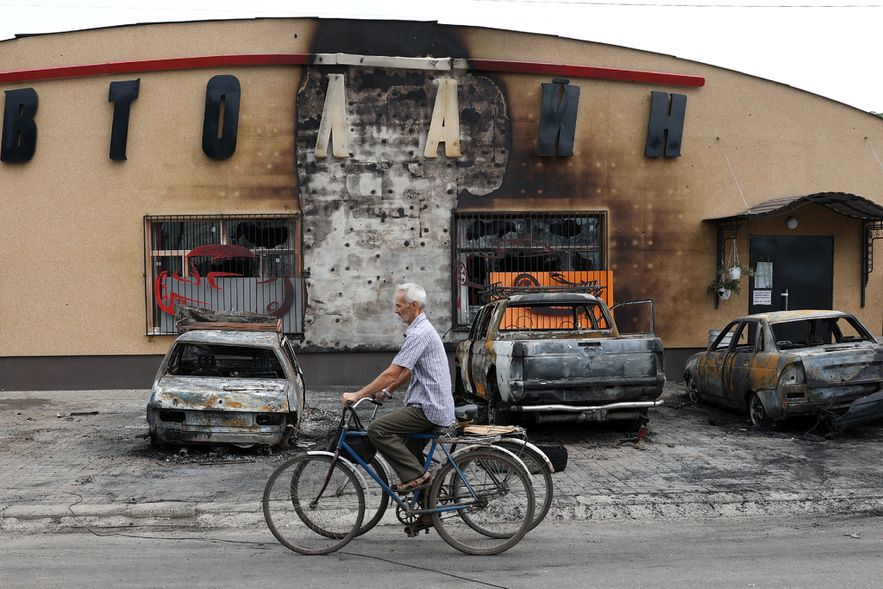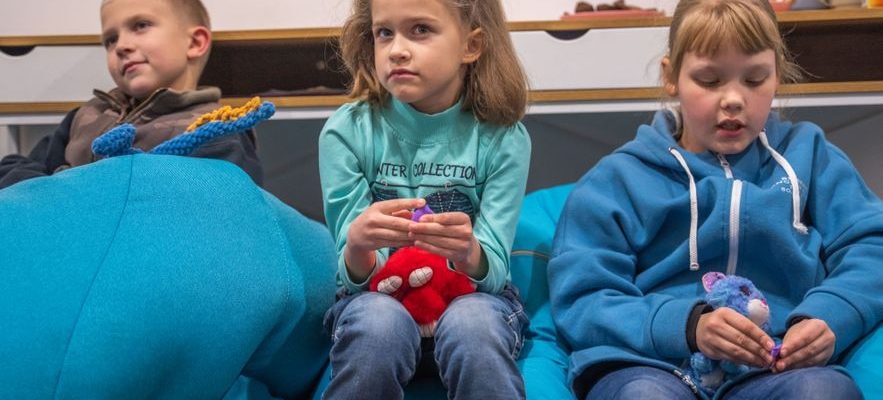In front of his glass of red wine, in the trendy district of Podil, on the banks of the Dnieper, Roman rubs his shaved head between two sips. In his uninterrupted flow of words, this 50-year-old Ukrainian recounts almost day by day the year that has just passed: his fundraising for the ecological transition, which became from February 24, 2022 fundraising for equipment military ; his back and forth on the front; his wife and daughter evacuated to Lviv in the west; and the funerals of his loved ones, almost every month… “Yesterday, I came back to Kiev to bury a friend, he confides, clutching his face in both hands. A very gifted engineer. as a volunteer in the army a year ago. A Russian missile mowed him down in Bakhmout. In the cemetery, there were so many fresh graves… We will never have enough streets to name in honor of all our hero.”
Roman does not fight on the front line but, as for his 44 million compatriots, the war has crushed everything in his life. She is his first thought when he wakes up, after having had a nightmare about it all night. With his relatives, they organized support groups on WhatsApp, to take news, “avoid tipping over” and go for drinks when one of them sinks. “Despite this, since the beginning of the conflict, my shrink and antidepressant bills have skyrocketed! I will probably have to start a support fund for my mental health costs”, manages to joke the entrepreneur.
At least ten million Ukrainians affected by psychological disorders
Even far from the front, the war is devastating the mental health of a majority of Ukrainians. 78% of the population has close relatives or friends who have been injured or killed since the beginning of the Russian invasion, according to a study published in early July by the Kiev International Institute of Sociology (KIIS). Not to mention the millions of displaced people, homeless in their own country or in Europe. “This ranges from moderate problems such as depression or anxiety, to much more severe forms such as psychoses, specifies Alisa Ladyk-Bryzghalova, head of the WHO mental health program in Kiev. In Ukraine, at least 10 million people are or will be affected by the psychological damage created by war at some point in their lives.” A huge task, almost insurmountable, especially since many psychologists have left the country. Bringing them back was made a priority by the Ukrainian government, starting in the spring of 2022.
In his glass-fronted start-up studios in kyiv, Artem Denysov is at the forefront of the battle for mental health. With his association Veteran Hub, the forties, red beard, sparkling blue eyes, supervises soldiers returning from the front and helps them readapt to civilian life. “There is a lot of talk about post-traumatic stress disorder in the military, but in reality all of Ukraine suffers from post-traumatic stress,” points out this fine connoisseur of human psychology, himself a volunteer in the army during the first month of the Russian invasion.
In order to support the soldiers, Artem Denysov crosses Ukraine, from the hospitals in the west to the front lines in the east. He takes the opportunity to closely observe his compatriots and their new behavioral tics. To define national trauma, the aid worker takes the example of cell phone anxiety. “In Ukraine, no one lets their mobile battery run out anymore, he says. You never know when missile attacks will make the light disappear, cut the electricity and plunge you for hours in darkness. … Our phones must be 100%, all the time, even if our power stations are less and less affected by the Russian strikes.”
Artem compares the current trauma to that suffered by older generations of Ukrainians, especially in the 1930s, during the great famines orchestrated by Stalin’s USSR to put down peasant revolts. With similar reflexes. “When I was a child, I made fun of my grandfather and my grandmother, who swallowed astronomical quantities of food as quickly as possible, as if they were finally breathing after being deprived of air, smiles this imposing fellow. It seemed comical to me at the time. Now I understand: it was the legacy of the great famines. We too will develop this kind of strange habits.
“I forget everything, all the time”
In kyiv, each story recalls the moral cost of this war. Externally, the Ukrainians retain their dynamism, their determination, their pride. A thirst for success that goes far beyond military victories. But in the depths of conversations, evils never take long to appear. Oleksandr is 24 years old and a brown lock falls on his eyes. While discussing, his calm voice swells, sometimes to the point of a cry, without this independent journalist realizing it. “When you come back from a report at the front, when you have sources who live in areas occupied by the Russians, and you’re warm in your bed, you can’t really sleep, explains the young man. You fall very low. Once, coming back from Kherson just liberated, I stopped talking for three weeks. Not a word. Then it came back.” His treatment: drown in work, multiplying projects. To distract the mind, deceive the memory. “Result, I have difficulty concentrating, I forget everything, all the time,” breathes Oleksandr. A way found by his brain to manage pain, according to his psychologist.
But not all citizens shocked by the war take refuge in work. Doctors are warning of a surge in addictive behavior, with a sharp rise in alcoholism and drug addiction. The first victims of these scourges, which lead to an explosion of domestic violence: children. “Every week, in the pacified regions of the west, we have at least two interventions for suicide attempts among young people, even very young people, says Olena Rozvadovska, co-founder of the association Voices of Children. No Ukrainian child is spared from war.”
“No Ukrainian child is spared by war,” says Olena Rozvadovska, co-founder of the Voices of Children association.
© / Photo The Voices of Children Charitable Foundation
In the west of the country, the anguish of the Russian strikes, population displacements or the loss of a loved one create all sorts of problems among adolescents, with a phenomenal increase in cases of anorexia and self-mutilation. Adults, on the other hand, appear helpless in the face of this suffering. The training distilled to teachers by Olena Rozvadovska, in order to transmit to them the basics of psychological support, systematically end in tears. “All the teachers collapse, relates the trainer. They tell how overwhelmed they feel, crushed by the situation. Recently, a teacher told me that he had just lost his son in combat, but that he had to likewise coming to class to support his students, not to let them down. It’s heartbreaking.”
In order to provide first aid to children in distress, the 70 psychologists of Voices of Children first organize group sessions. Usually, about ten exchanges of this type make it possible to open the dialogue and to direct the child towards a personalized follow-up if necessary. “But in eastern Ukraine, with the young people who have suffered the occupation of the Russian army, ten sessions are barely enough to ‘unfreeze’ them, sighs Olena. Before that, the children are literally frozen. may smile but inside there is nothing.” Twenty sessions are then necessary before establishing a personalized psychological support program, and trying to get out of the Russian nightmare.
A national emergency plan for mental health
Saving this generation has been made a great national cause by the Ukrainian government, with a plan launched by the first lady, Olena Zelenska. “Ukraine has mobilized in an impressive way on mental health, confirms Alisa Ladyk-Bryzghalova, of the WHO. The government has understood that the essential psychological support must come from the close entourage: the family, the friends, neighbours, even colleagues or teachers. When basic help is provided in the first days following the traumatic event, it lowers the explosive potential for a mental health disorder.” Since the start of the Russian invasion, mobile apps specializing in psychological support, recommended at the first signs of emotional distress, have met with dazzling success in Ukraine.
Sign of the importance of this subject, at the end of June, Volodymyr Zelensky issued a surprising proposal to treat the traumas of his population: legalize therapeutic cannabis. An initiative that is not unanimous in the medical world. “We must be careful with innovations in humanitarian crisis situations: when you take care of vulnerable people, you must overprotect them, underlines Alisa Ladyk-Bryzghalova. There are already enough methods that have proven themselves and the WHO recommends to stick to it.”

Vehicles burned after a strike in Lyman, eastern Ukraine, July 8, 2023
© / afp.com/STRINGER
Beyond the military scenario, Ukraine’s path remains strewn with challenges for the coming months and years. In his office on the outskirts of kyiv, Artem Denysov stares at the floor when he talks about the end of the conflict, aware that his country will still have to face many hardships. “I dread this day of victory as much as I hope, says the co-founder of Veteran Hub. On that day, we will know the price paid to win this war. For the moment, we do not know the number of dead , everything is classified, but we can feel it, from the number of flags in the cemeteries, from the far too many funerals. On the day of victory, our society will undergo a gigantic psychic collapse, of which we have already had a glimpse in the middle of the war, after the liberation of occupied territories… When we see the images, when people start talking… The price will be very high.”
Ukraine already knows how badly its infrastructures and its cities have been damaged by the Russian army. The extent of the psychological pain and trauma on its population remains a question mark, crucial for its future. “Our society, too, was destroyed, believes Artem Denysov. Physically and morally. For our country, the military victory will mean the first day of the second phase, it will not be just a parade and a big party. No, we will have to pull us all together and rebuild us. Nobody else will. Nobody.”
